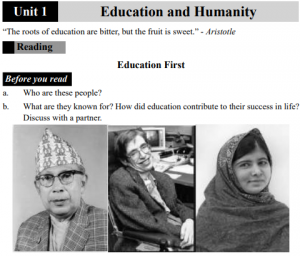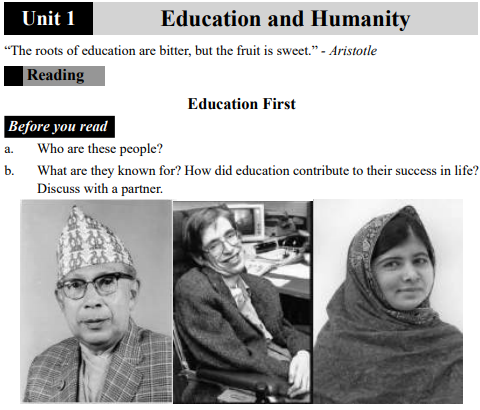Unit-1
Education and Humanity ‘Education First’

Exercises from the Book
Ways with words (Page:7)
A) Find the words from the text which mean the following.
a) a messenger or representative, especially one on a diplomatic mission
Ans: Envoy
b) the state or quality of being worthy of honor or respect
Ans: Dignity
c) harm done to someone in response to harm
Ans: revenge
d) a person who holds extreme views in political or religious matters
Ans: extremist
e) sympathetic pity and concern for the sufferings or misfortunes of others
Ans: compassion
f) a person who is believed to speak for God
Ans: prophet
g) the study of the nature of knowledge, reality and existence
Ans: Philosophy
h) the use of physical force so as to injure, abuse, damage or destroy
Ans: violence
i) an unreasonable dislike of a particular group of people or things
Ans: prejudice
B) Match the words on the left with their opposite meanings on the right.
Ans:
| a. honour | i. disgrace |
| b. innocent | ii. guilty |
| c. brutality | iii. kindness |
| d. forgiveness | iv. punishment |
| e. illiteracy | v. literacy |
Class 11 New Compulsory English Unit-1 Education and Humanity ‘Education First’ Exercises
Comprehension Page: 8
Answer the following questions.
A. Why did the speaker receive thousands of good-wishes cards and gifts from all over the world?
Ans: The speaker received thousands of good-wishes cards and gifts from all over the world for her fast recovery and a new life. On the 9th of October 2012, the Taliban shot her on the left side of her forehead.
B. According to the speaker, what are hundreds of human rights activists and social workers struggling for?
Ans: There are hundreds of human rights activists and social workers, who are not only speaking for human rights, but who are struggling to achieve their goals of education, peace and equality.
C. What has she learnt from Gandhi?
Ans: She has learnt the philosophy of nonviolence from Gandhi.
D. In what sense is peace necessary for education?
Ans: In many parts of the world wars and conflicts stop children to go to their schools. So, peace is necessary for education.
E. According to the speaker, what are the main problems faced by both men and women?
Ans: Poverty, ignorance, injustice, racism and the deprivation of basic rights are the main problems faced by both men and women.
F. What is Malala calling upon all governments?
Ans: She is calling upon all governments to ensure free compulsory education for every child all over the world.
G. What is the main message of this speech?
Ans: Education is the only solution to end all problems of the world like poverty, injustice, violence and ignorance. Education empowers ourselves with the weapon of knowledge. So, we must give priority to education.
Critical Thinking (Page: 9)
A) All children have the right to quality education. How can we ensure this right to every child? Discuss the role of the government and the parents to make sure that every child can attend school.
Ans: All children have the right to quality education. We can ensure this right to every child by making education compulsory to all children by the government. The government and the parents should play a vital role to make sure that every child can attend school.
Parents have a lasting impact on children’s learning by creating a fruitful environment for learning. When parents give time for their children’s education, children are more engaged with their school work, stay in school longer, and achieve better learning outcomes.
Education should be administered by governmental bodies or non-profit institutions. They should take control over of education sectors to ensure education for all. Government should make education free for all children. Government should fight against terrorism, ignorance and violence to protect children from brutality and harm. It must expand the educational opportunities for girls. Government should establish stable peace in the country to create an environment for education.
B) Do you think that there is still discrimination between sons and daughters in terms of providing education in our country? What strategies do you suggest to overcome such discrimination against girls?
Yes, I think that there is still discrimination between sons and daughters in terms of providing education in our country, Nepal.
In these days, each and every person should be allowed to live equally and respectably but girls are deprived of their basic rights of education. Male dominated societies are creating some boundaries to create discrimination between girls and boys in terms of education. This case is more visible in rural terai and hilly mountain areas of Nepal. In rural and remote areas of Nepal, most of the societies are patriarchal. Girls are given certain tasks in kitchen and they are sent to government schools. Boys are considered as a backbone of their family. So, they send boys to private boarding schools. A family invests a lot for boys to secure his future. Girls are the victims of social, moral, ethical, economical and cultural problems created by male dominated society.
Strategies to Overcome Discrimination Against Girls:
By Governments:
A) Government should ensure equal access to and completion of secondary an education to girls.
(b) Government must start functional literacy and numeracy programmes, for out-of-school girls
(c) Promote human rights education in educational programmes to girls.
(d) Increase enrolment and improve retention rates of girls by allocating appropriate budgetary resources
e) should run campaigns and flexible school schedules, incentives, scholarships, access programmes for out-of-school girls
(f) Provide education and skills training to increase girls opportunities for employment and access to decision-making processes;
(g) Provide education to increase girls’ knowledge and skills related to the functioning of economic, financial and political systems.
C) A Chinese philosopher Confucius said, “If your plan is for one year, plant rice; if your plan is for ten years, plant trees; if your plan is for one hundred years, educate children.” What is the meaning of this saying? Elaborate with examples.
Ans: The meaning of this saying is that if we want Progress and development of humanity then we must invest in education of children.
Rice is a short term investment. It generates returns in a year. The tree is a longer term investment requiring ten years to mature. The well educated child influences the future forever through his or her influence on endless generations. Therefore the education of a child is a worthy and a wise investment. It takes time to educate people and turn them into productive members of our society. It is not a task like growing crops or trees where you will see the benefits in one to ten years.
Good education is the best long term investment for society. We can see that in East Asia today: their postwar investments in education are paying off tremendously as East Asia is now the fastest growing region in the world. Asian countries like Japan, China and India are growing faster and faster because of their long term vision in Education.
Writing
A) Recall your school days. Write in three paragraphs of an event that you always remember.
A school organizes many events where students can participate to explore their inner talents. These events help the students to socialize them.
I used to take part in school events during my school days. I used to take part in annual function of my school. It was organized in the month of Magh of 2066 BS. I participated in Speech competition. My topic was ‘An Importance of Girls Education’. On that day, our principal sir wished me best luck for the speech. The event began when our social teacher gave welcome speech to the all parents. At the beginning I was nervous to deliver my speech but later on I spoke fluently on my topic. I was shocked when principal sir announced my name for the first prize of speech competition. I received a medal and certificate from a board member of our school. We took group photograph for a memory. My class teacher patted my back and said that he loved my speech. I introduced my parents to my class teacher. We discussed about school events and board exams.
The event changed my life completely. Before that event I was shy and nervous boy. After that event I participated in all contests of our school events. Now, I miss my school days and evens. My school days were golden days of my life.
Class 11 New Compulsory English Unit-1 Education and Humanity ‘Education First’ Exercises
B “Education empowers a person”. Elaborate this statement giving examples of your personal experience.
Ans: Education is very important in everybody’s life. It enables people to face the challenges of life efficiently. Despite this, education remains a luxury that most people consider not a necessity. January 24 is the International Day of Education. It is a day to celebrate the transformative power of education and its role in human well-being. Education is one of the most powerful tools that can help people build a better world. Education can also be used to describe various aspects of a person’s life. Education can provide a child with the independence and confidence to live a life of their choice. It also helps them develop their personality and contribute to the society. Education is the key to development. It can change the course of a person’s life and elevate the whole society. With education and learning, students will have a better understanding of the world’s right and wrongs, which will help them come up with better solutions. Education has the power to lift all. It can improve the quality of life for all.

